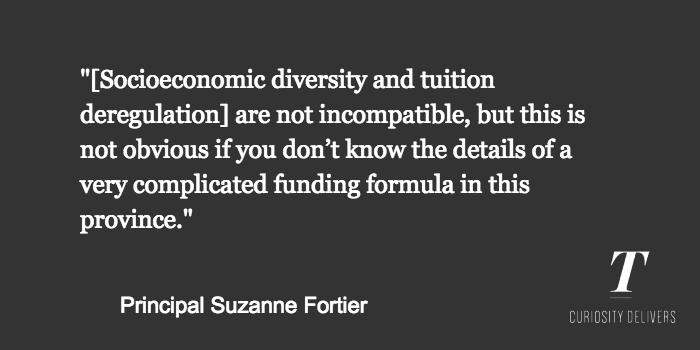At its third meeting of the year on Nov. 18, the McGill Senate expressed hope that the provincial government would allow for tuition deregulation for international, and potentially non-Quebec Canadian students across all faculties. Amendments to the university’s safe disclosure policy and the continued problem of deferred maintenance to infrastructure were also discussed.
Tuition deregulation
McGill University Principal Suzanne Fortier explained the benefits of a self-funded tuition model for the university.
“If tomorrow […] all international fees were deregulated, we at McGill would [not have an] insignificant amount of resources which we could put towards increasing the quality of our programs and giving bursaries to our students,” Fortier said.
Fortier also discussed the way that tuition money is currently redistributed across the province to other universities in Quebec.
“Each of our students who is not a Quebec resident contributes to the Quebec bursary program,” she said. “However, those students are not eligible for the Quebec bursary program themselves. If we collected those fees, rather than send them to Quebec City, we would be able to use them in our own bursary program for international, non-Quebec, and Quebec students.”
Fortier went on to discuss Quebec’s complex funding structure for universities.
“[Socioeconomic diversity and tuition deregulation] are not incompatible, but this is not obvious if you don’t know the details of a very complicated funding formula in this province,” Fortier said.
Meanwhile, Arts Senator Erin Sobat questioned the university’s model for deregulated tuition.
“It was mentioned that McGill will apply a policy of ‘market rates,’ looking at our peer institutions,” Sobat said. “Would the university consider internal targets, an alternative to the market rate model?”
Provost Christopher Manfredi responded to Sobat by explaining that such decisions would likely be made at the faculty level, should deregulation be granted. The Faculty of Management, whose tuition has been deregulated since 2008, already utilizes such a method to set prices.
Manfredi also addressed questions of how the university planned to adapt tuition policy to the diversity of international funding models for prospective students.
“We’ve been working very hard on the philanthropic front to establish specialized financing programs for those students—the Mastercard program is a good example of that,” Manfredi said.
It was later revealed in an annual financial report presented to the Senate by McGill Vice-President (VP), (Administration & Finance) Michael Di Grappa that McGill returns $72 million each year to the province from the tuition paid by international and out of province students.
Deferred infrastructure maintenance
Di Grappa presented the university’s annual financial report which cited, amongst other problems, a $1.3 billion tab in deferred infrastructure maintenance on campus. One senator suggested a fundraising campaign, similar to that held in 2013, which raised over $1 billion for the university. Di Grappa, however, largely dismissed such an idea.
“Donors don’t want to give to bricks and mortar anymore,” he said. “There certainly wasn’t much in the last campaign that gave to deferred maintenance. Donors generally tend to prefer to give money for student support, scholarships, chairs, programs—that kind of thing”.
Di Grappa did remark, however, that a fundraising campaign would most likely be instituted should the university acquire the Royal Victoria Hospital Complex.
“If we were to acquire The Royal Victoria Hospital, there could be a campaign tied around that; but that is still very preliminary,” he said.
Safe disclosure policy
The only matter that elicited much disagreement amongst senators during the session was in regards to the university’s new safe disclosure, or whistle-blowing policy, designed to facilitate the good faith reporting of improper activities, such as academic and research misconduct.
University Libraries Senator Marc Richard felt that the policy did not do enough to protect accused individuals who are found innocent.
“The first sentence assures that the discloser is afforded protection in regard to position and to reputation,” he said. “What it does not do is afford the same protection to the responded […] this is particularly important to respondents who happen to be found innocent.”
Faculty of Law Senator Angela Campbell opposed such a change.
“The policy is for individuals who often feel too vulnerable to come forward,” she said.
Campbell also remarked that the new document clearly delineates the responsibility of the university to those found innocent.
“This policy has a provision in it that protects the right of the respondent,” she said. “There is a procedurally fair mechanism in place to investigate complaints.”
Ultimately, a motion to make a minor edit to the policy’s statement of principles to reflect protection of those ‘respondents’ found innocent failed in a vote by a roughly three-to-one margin.









